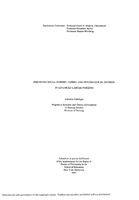Perceived social support, coping, and psychological distress in advanced cancer patients
View File(s)
Visitor Statistics
Visits vs Downloads
Visitors - World Map
Top Visiting Countries
| Country | Visits |
|---|
Top Visiting Cities
| City | Visits |
|---|
Visits (last 6 months)
Downloads (last 6 months)
Popular Works for Zabalegui, Adelaida by View
| Title | Page Views |
|---|
Popular Works for Zabalegui, Adelaida by Download
| Title | Downloads |
|---|
View Citations
Citations
The purpose of this study was to examine the extent to which perceived social support and coping mechanisms contribute to explaining psychological distress in advanced cancer patients receiving chemotherapy. The Lazarus and Folkman stress and coping model (1984a) provided the framework. Data were collected in a convenience sample of 132 advanced cancer patients, aged 33 to 83 from the metropolitan area of New York. The participants had breast (30%), ovarian (20%), lung (13%), colorectal (10%), or other (27%) cancers. Perceived social support was assessed by the Personal Resource Questionnaire-85-Part 2 (Brandt & Weinert, 1987); the coping strategies of cognitive escape-avoidance, behavioral escape-avoidance, distancing, focusing on the positive, and seeking support were assessed by the Ways of Coping Inventory-Cancer Version (Dunkel-Schetter et al., 1992); and psychological distress was measured by the Profile of Mood States (McNair et al., 1992). The data were analyzed using the Pearson product moment correlation and multiple regression analyses. The coping strategies distancing and cognitive and behavioral escape-avoidance relate individually to psychological distress. Distancing was negatively related ($r = {-}.25$) and cognitive escape-avoidance ($r = .39$) and behavioral escape-avoidance ($r = .38$) positively related to psychological distress ($p < .01$). Collectively the coping strategies explained 36% of the variance of psychological distress. Behavioral escape-avoidance was the most important coping mechanism (Beta =.40, $p < .001$) contributing to overall psychological distress. This was followed by cognitive escape-avoidance (Beta =.29, $p < .001$) and distancing (Beta = $-$.24, $p < .01$). Over and above coping strategies, perceived social support explained an extra 7.6% of the variance of psychological distress. Perceived social support interacted with behavioral escape-avoidance. High psychological distress occurred when advanced cancer patients had high levels of behavioral avoidance, especially when they perceived social support to be low. The coping strategies did not mediate the effect between perceived social support and psychological distress. To lower psychological distress in advanced cancer patients health professionals must help patients to suppress cognitive and behavioral escape-avoidance and potentiate distancing as well as their perception of social support.
This dissertation has also been disseminated through the ProQuest Dissertations and Theses database. Dissertation/thesis number: 9737488; ProQuest document ID: 304361082. The author still retains copyright.
This item has not gone through this repository's peer-review process, but has been accepted by the indicated university or college in partial fulfillment of the requirements for the specified degree.
| Type | Dissertation |
| Acquisition | Proxy-submission |
| Review Type | None: Degree-based Submission |
| Format | Text-based Document |
| Evidence Level | Cross-Sectional |
| Research Approach | Quantitative Research |
| Keywords | Stress Coping Mechanism; Chemotherapy; Emotional Stress in Patients |
| CINAHL Subject(s) | Cancer Patients; Perception; Support, Psychosocial; Coping; Chemotherapy, Cancer; Stress, Psychological; Perception--Evaluation; Support, Psychosocial--Evaluation; Coping--Evaluation; Chemotherapy, Cancer--Psychosocial Factors; Stress, Psychological--Evaluation |
| Grantor | New York University |
| Advisor | Hoskins, Carol N. |
| Level | PhD |
| Year | 1997 |
All rights reserved by the author(s) and/or publisher(s) listed in this item record unless relinquished in whole or part by a rights notation or a Creative Commons License present in this item record.
All permission requests should be directed accordingly and not to the Sigma Repository.
All submitting authors or publishers have affirmed that when using material in their work where they do not own copyright, they have obtained permission of the copyright holder prior to submission and the rights holder has been acknowledged as necessary.
Related items
Showing items related by title, author, creator and subjects.
-
Social support, psychological and physical states among Japanese women with breast cancer
Makabe, ReikoIn Western cultures, it has been reported that social support has effects on health outcomes among women with breast cancer. However, little is known about social support and the effects on health outcomes among Japanese ... -
The effect of social support on women's perception of perimenstrual changes
Morse, Gwen G.The unidimensional approach that has dominated research on premenstrual syndrome (PMS) has been remiss in visualizing the diversity of factors that may be involved in women's menstrual cycle experiences. Traditional menstrual ... -
The impact of stress, coping, constructive thinking and hardiness on health and academic performance of female registered nurse students pursuing a baccalaureate degree in nursing
Cox, Diane D.The purpose of this study was to test a theoretically-derived model of hardiness, constructive thinking, coping complexity and perceived stress level in predicting academic performance and perceived health status among ... -
The relationships among emotion regulation, role stress, and psychological distress in surrogate decision makers of the chronically critically ill patients
Variath, Mary NjalianBackground: Advancement in technologies has contributed to patients surviving critical illness, but continuing to live with chronically critically ill conditions. A majority of such patients experience transient or persistent ... -
The perception of physical activity and social support for physical activity among Native Hawaiians 55 Years and older
Hanashiro, VernaSignificance: The benefits of physical activity on healthy aging and longevity have repeatedly been identified. Despite these known benefits, sedentary living is a serious and pervasive health problem among older adults ...





